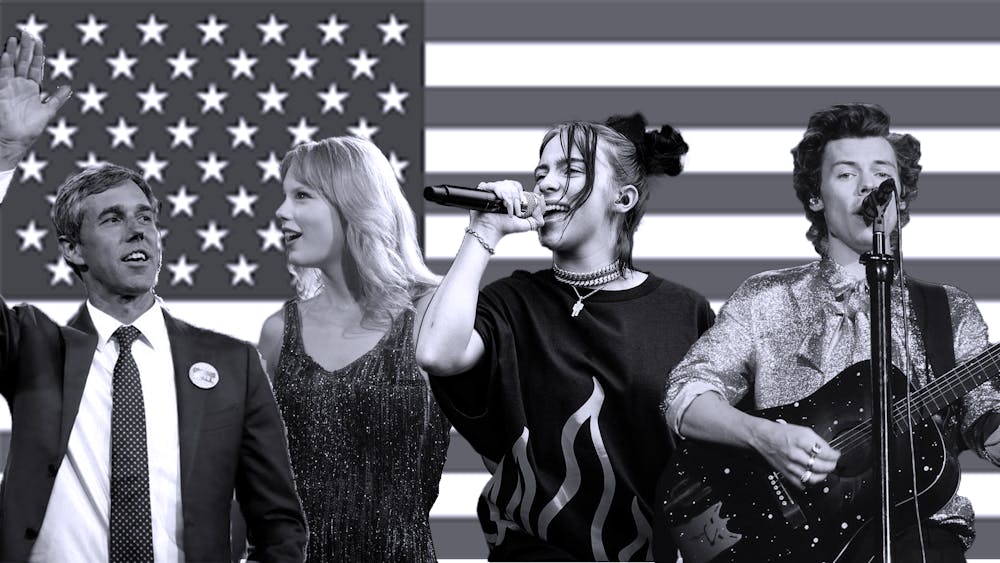Following superstar Harry Styles’ 15–show run at Madison Square Garden, he continued his “Love On Tour” campaign by taking to a Texas stage. One key difference? He had an exceptional fan in his Austin audience: Beto O’Rourke—the Democratic Texas gubernatorial candidate running against incumbent Republican Greg Abbott. At the sold–out show, Styles flashed his brown and black guitar advertising a “Beto for Texas” sticker. He motioned toward the logo as the endorsement shone on the jumbotron, panning to reveal O’Rourke beaming in attendance. The young crowd shook the stadium in applause at the singer’s political statement.
Later that evening, Styles and O’Rourke posed for a picture together. It broke the internet. Fans erupted into a frenzy, posting on Twitter with comments such as, “Lol name a more iconic duo I’ll wait.”
This isn’t the first time that the “As It Was” singer has revealed his election preferences. During the 2020 presidential campaign, Styles demonstrated his support for now–President Joe Biden, retweeting a campaign video and commenting, “If I could vote in America, I’d vote with kindness.”
And as time continues, influencers have infiltrated political scenes more and more. Celebrity endorsement has never been easier. Through a quick story post, users can offer unsolicited political opinions to millions of followers. The 2020 presidential election amassed unparalleled input from celebrities, setting a precedent for upcoming elections.
But the question remains: Do these eye–catching endorsements actually shape election results, and how much power do these stars truly have over voting behaviors?
The One Direction alum is far from the first to engage in such conversation with fans. Taylor Swift and Billie Eilish are some of the numerous celebrities capitalizing on their stardom to prime electoral involvement. For decades, young voter turnout was—and still is—abysmal, with historically lower rates than older age groups; despite an increase in their numbers over the years, only half of eligible voters below the age of 30 participated in 2020’s presidential election. To expand the longevity of voting, encouragement is essential. The earlier the practice begins, the more likely it is that voting will become a habit among diverse populations.
Both Swift and Eilish joined Styles in teaming up with HeadCount, the nonpartisan organization spearheading campaigns to promote young democratic participation. Since the 2020 election, over eight million people have joined the ranks of voting eligibility. “Having the support of individuals like Harry Styles has a tremendous impact,” HeadCount Co–Founder and Executive Director Andy Bernstein says. Such a sizable increase can generate pivotal effects in the midterm elections—and, by extension, policy.
Taylor Swift—who boasts 228 million followers on Instagram and countless sold–out concerts—routinely speaks on her alignments with social issues: fighting for gender equality, supporting LGBTQ rights, and combating racism. In her initial foray into politics, she endorsed Democratic candidates for the 2018 midterm elections while calling on young fans to amplify their voices on social issues. Over the span of 48 hours after her endorsement, more than 160,000 people (predominantly aged 18 to 29) registered to vote, drawing the most traffic to Vote.org since National Voter Registration Day. In a statement, the nonprofit said that “Taylor’s post has helped bring out young voters.”
Similarly, Billie Eilish uses her fame for causes including climate change activism, racial justice, and voting and pro–choice rights. She makes it a priority to keep her fans in the loop regarding contentious matters. Bernstein says that Eilish has been an avid advocate for voting and a “supporter of HeadCount” even before she became eligible to vote. Now, Eilish is doubling down on the political initiative she began in 2020, even going so far as to offer a sweepstakes prize for a lucky voter to attend her concerts abroad—signed merch and flights included. Evidently, Eilish is ready to commit this mission as part of her brand.
On tour, Eilish frequently takes to the mic during her track “all the good girls go to hell” to express her rage regarding the looming climate crisis. “I’m working with HeadCount to encourage everyone to show up at the polls and use their voice during these midterm elections,” Eilish says in an interview with Seventeen. “With what is going on in our country, we need to get out to the polls and vote for what we believe in. Not showing up is not an option.”
As Styles croons, it’s a sign of the times. While America’s political divide becomes more polarized, people look to their idols for guidance. So when worldwide singing sensations encourage their fans to become more politically engaged, who’s going to say no?
Ultimately, in certain cases, celebrity political engagement is influential in the concerted push for voter participation. Although there’s a lack of research documenting a causal relationship between celebrity authority and voter turnout, this isn’t to say that the music industry’s influence in political consciousness is futile. By attracting attention to specific candidates as well as rallying young fans to vote, starstruck audiences may feel more inclined to enact their civic duty now and in the future.
Indeed, celebrities with young followings are crucial in reshaping our country. With the attention of millions at their fingertips, all influencers should be using their platforms to evoke positive change.
Election Day is weeks away. Greater visibility for social injustice is essential—because there’s too much at stake on the ballot.
Once again, as Styles says, we are not simply “living in a daydream.”







